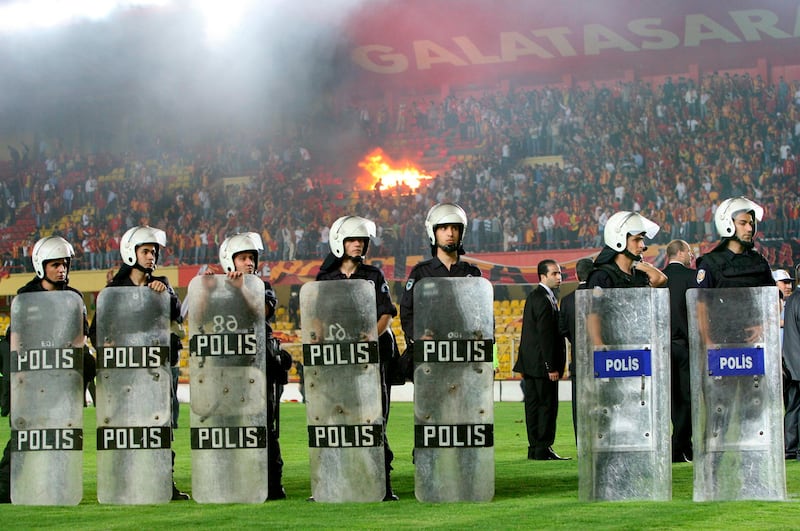Rainer Hollman, Galatasaray's German coach, had just seen his team come from 2-0 down to draw 3-3 with Manchester United at Old Trafford in the Champions League in 1993.
The Turkish side's comeback stunned United and Alex Ferguson later admitted that he was "in shock". His Galatasaray equivalent was delighted and, with the second leg in Istanbul, fancied his side's chances of progressing to the group stages.
As United had never played in Turkey, one journalist asked Hollman if there would be a hot welcome for the English in Istanbul. "They'll be waiting for you," smirked the German as he left the press conference. "At the airport."
Two weeks later, the United team were met by hundreds of fans screaming the "Cim Bom Bom" chant derived from Galatasaray's nickname and waving "Welcome to Hell" banners.
The atmosphere at the following night's game justified the hype and Gary Neville, the United defender, still maintains that it was the "most hostile atmosphere I've ever known".
"When we walked out into the stadium it was the most incredible noise I'd experienced in my life," Neville added. "I was only a young lad, but I probably learned more in 10 minutes that night than I had in two years playing for the reserves."
At least Neville and his teammates got to experience the febrile atmosphere in the notorious Ali Sami Yen Stadium. I was among the 164 innocent United fans locked up in prisons around Istanbul for 24 hours and then deported.
We missed a 0-0 game (a result sufficient to send the home side through) and Eric Cantona fighting with Turkish police.
"After the game, the police were supposed to be protecting us, but one of them whacked me as I went down the tunnel," Paul Parker, the former defender, said. "When we got on the coach, jubilant Galatasaray fans banged on the side, attempted to rock it and threw anything they could get their hands on while the police made no attempt to intervene.
"At the airport there was no security and we had to wait the best part of three hours before they allowed our plane to leave. I am never going back to Turkey. Never."
United and Galatasaray were drawn together a year later and I travelled again.
The atmosphere was unlike anything I had experienced, the riot of flares, flags and passion unmatched in western Europe.
Every Galatasaray player appeared to have a connection with the crowd which saw them run towards them when they chanted their name, an ongoing, sabre-rattling ritual known as the buraya.
It wasn't only a lunatic fringe - the female Turkish Prime Minister joined in with the hero worship. Turkish supporters see themselves not as passive spectators, but as an active component in the event.
United have long since got used to the Turkish welcome and will be expecting a cauldron of noise when they play Bursaspor tonight - a team known for the passion of their fans in their 25,000 capacity stadium.
Ferguson's side have ventured back to Turkey several times since 1993, each time to a louder reception.
At Fenerbahce in 1996, the hosts turned their floodlights off 20 minutes before kick off to improve the spectacle of their fans setting fire to rolled up newspapers so that the stadium looked like it was ablaze.
And the referee's whistle did not stop the public address announcer from bellowing out constant support for his players.
It took the intervention of Sir Bobby Charlton, the United legend and now a club figurehead, to a Uefa official 15 minutes into the game before it stopped.
Derbies between the three Istanbul giants (Besiktas are the third) are intense and volatile and the actions of Galatasaray's former coach Graeme Souness only stoked them up.
In an act of adrenaline-fuelled bravado in 1996 - the Scot, who played for Liverpool and Glasgow Rangers, planted a massive Galatasaray flag in the centre of the turf at Fenerbahce's Sukru Saracoglu stadium after a derby win, which ensured him hero status with the Cim Bom faithful.
The tribal triumphs and madcap antics of Turkish football may shock the senses, but there has been a more sinister side when English and Turkish clubs have met in the past.
The English were regarded as the instigators of hooliganism (labelled "the English disease") in the 1970s and 80s and Turkish hooligans wanted to fight those visitors whose reputation had preceded them.
Arsenal and Galatasaray fans clashed during prolonged battles in Copenhagen when the sides met in the 2000 Uefa Cup final.
That was the year two Leeds United supporters were stabbed to death after violent clashes with Galatasaray supporters in central Istanbul ahead of a Uefa Cup clash.
The perpetrators were brought to justice and Turkish clubs were told to clean up their acts.
Both Galatasaray and Fenerbahce left their crumbling homes and play in state of the art stadiums, but their fans remain fervent for big games.
New foreign signings are given a rapturous welcome at the airport, while supporters arrive hours before kick off and fan leaders stand with their backs to the game on specially constructed platforms as they start chants with loud hailers.
Given that most stadia in western Europe are becoming more sanitised and subdued, the Turkish passion should be celebrated. It is not unsafe to watch games in Turkey, but as Manchester United and the 400 travelling fans will find out tonight, nor is it for the faint-hearted.
11.45pm, Aljazeera Sport +5






